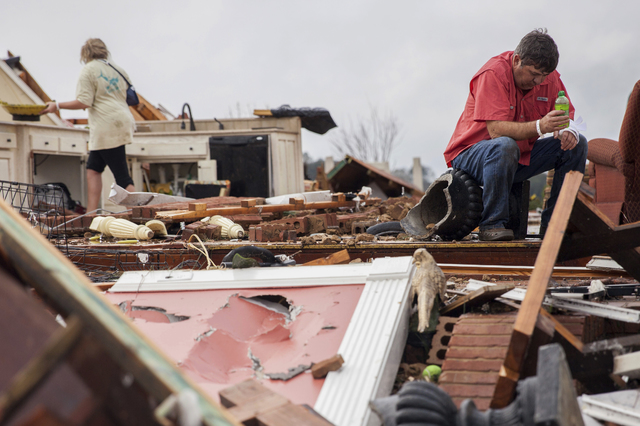Storms kill 16 in southeast US; more tornadoes ahead

Deadly weather in the Southeast killed 16 people and injured dozens more, authorities said Sunday, as residents along the Georgia-Florida line braced for more intense, fast-moving storms — including unusually strong “long track” twisters.
On Sunday, an apparent tornado blew through a mobile home park in rural Cook County in southern Georgia — sheering off siding, upending homes and killing seven people, local officials said. An eighth death was reported in Cook County by state officials, although it was unclear whether that victim lived in the park.
Coroner Tim Purvis said the tornado “leveled” the park before dawn Sunday and that emergency responders searched for survivors for hours after the twister struck. Purvis said the park had about 40 mobile homes, and roughly half were destroyed. The area was cordoned off by police.
Not far from the mobile home park, 19-year-old Jenny Bullard wore a sling on her injured arm as she combed through the rubble of her family’s brick house. All that remained standing Sunday afternoon was the master bedroom and parts of the kitchen.
“It’s a horrible tragedy,” Bullard said. “But all this stuff can be replaced. We can’t replace each other. We’re extremely lucky.”
Bullard said she awoke before dawn Sunday to the sound of hail pounding the roof. When she went outside her bedroom door, she was knocked down by a collapsing wall in the hallway. She managed to get up and found her father calling for her, trapped under a pile of debris.
She pulled him free, and they found her mother in the master bedroom. They escaped by climbing over piles of furniture and debris where the wall to their home office once stood.
President Donald Trump said Sunday he had spoken with Georgia Gov. Nathan Deal and “expressed our sincere condolences for the lives taken.”
“Tornadoes were vicious and powerful and strong, and they suffered greatly,” Trump said during a White House ceremony where he was swearing in aides. “So we’ll be helping out the state of Georgia.”
Several homes appeared to be destroyed along on a road within about 2 miles of the mobile home park, with cinderblocks scattered on the ground, and pine trees uprooted and snapped in half. The tops of broken utility poles lay alongside the road.
The South Georgia Motorsports Park in Cecil was heavy damaged; a grandstand was ripped apart. Barrels, signs, insulation and garbage were strewn over the speedway and parking lot.
Georgia’s governor declared a state of emergency in seven southern Georgia counties, freeing up state resources to assist with recovery efforts.
“Our thoughts and prayers are with Georgians suffering from the storm’s impact,” Deal said in a statement.
In addition to eight deaths in Cook County, four people were killed in adjoining counties Sunday. Another four people were killed in Mississippi by a tornado on Saturday, bringing the weekend death toll to 16.
The National Weather Service said southern Georgia, northern Florida and the corner of southeastern Alabama could face more forceful tornadoes later Sunday, in addition to damaging winds and large hail. Long track tornadoes, somewhat rare and capable of staying on the ground for 20 or more miles, were possible.
Bill Bunting, the chief of forecast operations at the weather service’s Storm Prediction Center, said meteorologists expect severe storms to again fire up in the Southeast and when they develop, the cells will move rapidly.
“There will be many severe storms covering a large area, and they will be moving so quick that you really need to heed the warnings, or it could be too late at that point,” Bunting said. “There will be a risk well after dark.”
Two of Sunday’s deaths occurred when a mobile home was struck by an apparent tornado in Brooks County, which moved the home roughly 100 yards.
“A tornado hit a mobile home, picked it up and put it in the middle of Highway 122,” Brooks County Coroner Michael Miller said. “I don’t know if it rolled or was lifted, but it blocked the entire highway.”
He said the storm struck in the middle of the night, at about 4 a.m. Sunday.
Catherine Howden of the Georgia Emergency Management Agency said earlier Sunday that the deaths occurred in Cook, Brooks and Berrien counties in southern Georgia near the Georgia-Florida line. She said another 23 people were injured.
The sheriff’s office and coroner in Berrien County could not immediately be reached for comment Sunday. Calls to their phones were met with busy signals for several hours.
While the central part of the U.S. has a fairly defined tornado season — the spring — the risk of tornadoes “never really goes to zero” for most of the year in the southeast, said Patrick Marsh of the Storm Prediction Center in Norman, Oklahoma.
January tornado outbreaks are rare but not unprecedented, particularly in the South. Data from the Storm Prediction Center shows that, over the past decade, the nation has seen an average 38 tornadoes in January, ranging from a high of 84 in 2008 to just four in 2014.
The last time the prediction center issued a high-risk weather outlook — where forecasters are very confident of a tornado outbreak — was in 2014. Sunday marked only the third time since 2000 that any part of Florida had been at a high-risk for severe weather, Marsh said.
“This is a pretty rare event in this location,” Marsh said.
If the storm fatalities reported so far this year — four each in Alabama and Mississippi and the 11 in Georgia — are all attributed to twisters, this January’s death toll would be worse than 1999. That year, 18 people died in series of storms in Texas, Arkansas and Tennessee.